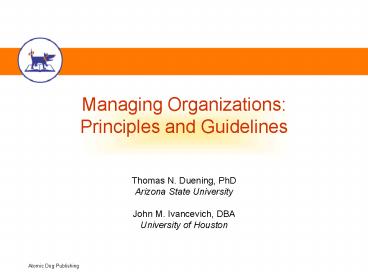PowerPoint Presentations Chapter 04 - PowerPoint PPT Presentation
1 / 21
Title:
PowerPoint Presentations Chapter 04
Description:
University of Houston. Atomic Dog Publishing. Chapter Four. Managing Globally. Part One ... 4-3c Politics. Government attitudes towards imports and direct investment ... – PowerPoint PPT presentation
Number of Views:19
Avg rating:3.0/5.0
Title: PowerPoint Presentations Chapter 04
1
Managing OrganizationsPrinciples and Guidelines
Thomas N. Duening, PhDArizona State University
John M. Ivancevich, DBA University of Houston
2
Part OneIntroduction to Management
Chapter FourManaging Globally
3
4-1 Introduction
- International competitors are a major presence
- Many reasons to go global
- Increasing opportunities
- Declining local markets
- Economies of scale
- Cost advantages
- Need to adjust to
- Varying consumer preferences
- Different employee work styles
- Political climate
- Unfamiliar culture
- A new strategy is to be created based on a new
set of assumptions
4
4-2 The Multinational Enterprise
- A firm doing business in two or more countries
- Has sales offices and manufacturing facilities in
numerous countries - MNEs view their scope of operation as global in
nature - Foreign companies have entered the United States
and many American firms are owned by foreign
multinationals
5
4-2a The MNE Decision
- Decision to become an MNE is a major one which
essentially comprises of three primary decisions - The international market to be served
- The products / services to be marketed
- The mode of entry into the market
- Export
- Foreign Activities
- Direct Investment
6
4-2a The International Market to Be Served
- Market size in the prospective country
- Countrys consumer wealth (per capita income)
- Ease of doing business
- Geographical location
- Language commonality
- Political climate
- Cultural climate
- Availability of human resources
7
4-2a The Products or Services to Be Marketed
- Market size in the prospective country
- Countrys consumer wealth (per capita income)
- Introduce successful products in the domestic
market - Example Kelloggs, Coca-Cola, McDonalds
- Phased Internationalization approach
- Introduce products based on market-research
reports - Example Ferreros Tic Tac breath mints, IDVs
Baileys Irish Cream liqueur
8
4-2a The Mode of Entry into Global Markets
- Three basic strategies
- Export
- Foreign activities
- Direct investment
9
4-3 The Global Environment
- Culture
- Economics
- Politics
10
4-3a Culture
- Cultures are learned
- Cultures vary
- Cultures influence behavior
11
4-3b Economics
- The economic influences of a country
substantially affects MNE performance. - Countries are classified as developed country
DC or less-developed country LDC. - LDCs comprise most of the world's population,
only about 25 percent of the world's
international business activity occurs in these
countries. - There is a changing attitude by both host
government and MNEs. - Improved relations have given rise to a doubling
of direct investment.
12
4-3c Politics
- Government attitudes towards imports and direct
investment - Efficiency of the government
- Stability of the government
- Business ethics
- Prevalence of terrorism
13
4-4 Management Functions Applied Globally
- Planning
- Organizing
- Leading
- Controlling
14
4-4a The Planning Function
15
4-4b The Organizing Function
- Complexity of organization
- Authority and decision making
- Evaluation, rewards and punishments
- Communication, information flow
- Staffing, recruitment and development
16
4-4c The Leading Function
- Varies in effectiveness from nation to nation
- Decision on local leader or an expatriate leader
- Advantages and disadvantages needs to be
carefully studied before deciding on either of
the options - Expatriate leader would be suited where there is
a shortage of managerial skills to oversee the
operation - Cost of hiring such a leader would be high and
sometimes might make a wrong hiring decision
17
4-4d The Controlling Function
- Standards
- Information
- Action
18
4-5 Global Economic Integration
- North American Free Trade Agreement (NAFTA)
- Formation of NAFTA has contributed to increased
intra-regional trade in North America - European Union (EU)
- Economic integration through trade in Western
Europe is much more advanced
19
4-5a The World Trade Organization
- WTO sets out the principal obligations to be met
by governments in implementing domestic trade
policies and regulations - Two rules forming the cornerstone of WTO
- Most Favored Nation (MFN)
- National treatment
20
4-5b Regional Trade Agreements
21
4-5c Implications for the United States
- A major question concerns the extent to which the
US will participate in the formation and
development of RTAs. - Companies within an RTA are becoming almost like
a domestic competitors. - U.S. must rethink their strategies for the
domestic market, since they do not want
competition from new companies outside the U.S.































